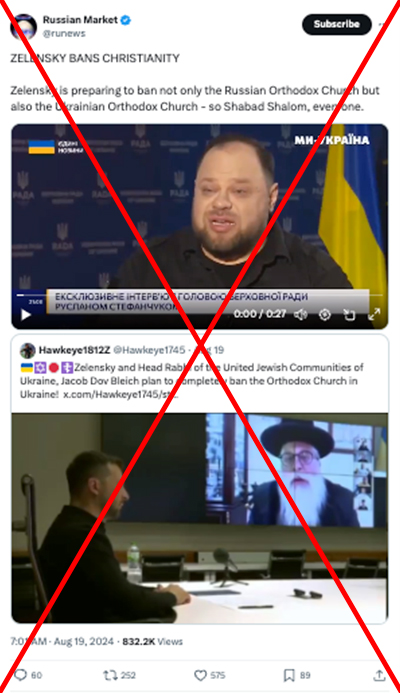
The Claim:
Kremlin aligned social media accounts are falsely claiming that Ukraine’s crackdown on the Russian-affiliated Ukrainian Orthodox Church (UOC) is a broad ban on Christianity in Ukraine. Furthermore, these accounts suggest a conspiracy between Ukraine’s Jewish president, Zelenskyy and the Head Rabbi of Ukraine. An article posted by Russian state media channel RT, also implies that Ukraine’s ban of the UOC is a ban on all Christianity in Ukraine.
The Facts:
The Ukrainian government has indeed taken steps to ban the Ukrainian Orthodox Church (UOC) associated with the Moscow Patriarchate. This action is primarily motivated by concerns over national security, given the church’s historical and ongoing ties to Russia, particularly amidst the ongoing war. Ukrainian authorities and many citizens believe that the UOC has been used as a vehicle for Russian influence and espionage, as there have been documented cases of UOC clergy collaborating with Russian forces or spreading pro-Russian propaganda.
Legislation passed by the Ukrainian Parliament allows for the banning of religious organizations affiliated with foreign states hostile to Ukraine. This includes the UOC, which has been under scrutiny for its ties to the Russian Orthodox Church and the Moscow Patriarchate, despite claims by the UOC that it has severed these ties. The Ukrainian government has cited various incidents, such as clergy caught cooperating with Russian forces, to justify these actions as necessary for national security rather than an attack on religious freedom.
Narrative Context:
This narrative aligns with broader Russian disinformation strategies, which often accuse Ukraine of oppressing Russian speakers and Orthodox Christians to justify Russian military and political actions. The portrayal of Ukraine’s actions as an attack on Christianity fits into the Kremlin’s attempt to frame its invasion as a defense of Russian culture and Orthodoxy. However, within Ukraine, these actions are largely seen as necessary measures to protect the country from Russian influence and to ensure national security during a time of war.
In conclusion, while RT frames this as a religious persecution issue, the broader context reveals it as a national security measure by Ukraine in response to the UOC’s connections with Russia and its potential role in undermining Ukrainian sovereignty during the ongoing conflict.
The tweet above also contains Antisemitic tropes:
Blaming Jews for Political Actions: The tweet connects the Head Rabbi of the United Jewish Communities of Ukraine, Jacob Dov Bleich, with an alleged plan to ban the Orthodox Church in Ukraine. This type of accusation plays into longstanding antisemitic tropes that portray Jews as having undue influence over political matters, often to the detriment of non-Jewish communities. Historically, Jews have been falsely accused of controlling governments or being behind major societal changes, usually in a negative light.
Targeting Zelensky’s Jewish Identity: By mentioning both Zelensky (who is Jewish) and Rabbi Bleich in the context of a conspiracy to ban the Orthodox Church, the tweet could be interpreted as attempting to link Jewish identity with an alleged attack on Christianity. This taps into a classic antisemitic narrative that Jews are antagonistic toward Christianity.

